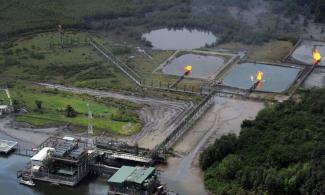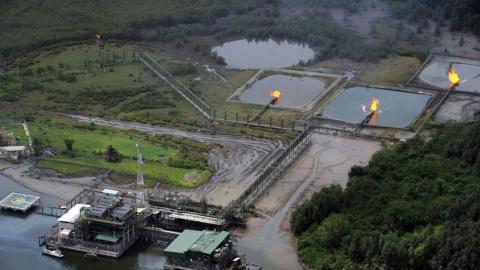
Chairman of the Society of Petroleum Engineers, Nigerian Council, Joe Nwakwue, told SaharaReporters that some of the assets would be difficult to develop under the current fiscal terms.
The Nigerian Government has been unable to develop much of its marginal oil field assets because the financial environment is too steep for local investors.
Chairman of the Society of Petroleum Engineers, Nigerian Council, Joe Nwakwue, told SaharaReporters that some of the assets would be difficult to develop under the current fiscal terms.
There are an estimated 200 oil leases – small fields discovered under existing leases held chiefly by international oil companies, which have stayed undeveloped for at least ten years.
The President draws power from the amended Petroleum Act of 1996 to declare such fields marginal and make them available to indigenous investors.

Nwakwue said many of these fields, which have a combined reserve of more than one billion barrels, would stay idle if the government failed to revamp the marginal fields program with better tax incentives.
“Right now we are defaulting to the royalty and tax rate of 85 per cent to marginal fields, that’s too high,” he said. “Marginal field companies should not be paying the same tax rate as royalty and tax rate or joint venture companies.”
The Olusegun Obasanjo administration had in 2003 allocated 30 of the fields defined as marginal to indigenous companies but only nine have attained ‘first oil’ till date.
Of the fields that have been added to the ongoing bid, 27 were not among the 30 the Obasanjo government perceived as being commercially viable.
“The things that made those assets marginal in the first place, they haven’t removed them,” he added.
Aside from restructuring the financial layout of this slice of oil assets, Mr Nwakwue believes the government should have waited for the economy to gain some semblance of normalcy before starting a bidding round for the fields.
The industry expert noted that the global economy was down at the moment and investments in crude oil exploration were either being wind down or delayed.
“This marginal field bid round is long overdue,” he said. “But I’m not particularly excited that it has been done at this particular time. Right now, nobody is making major investments, telling people to bid at a time like this, is forcing them to make investments when there is maximum uncertainty.”
The Department of Petroleum Resources, the arm of the Federal Ministry of Petroleum, which supervises the industry, said on its website that it hoped to earn N2.36bn in non-refundable fees for the federal government through the process.
Each bidder is expected to pay an estimated N46.98m, consisting of $115,000 and N5m.
There are 57 fields on offer.
Nwakwue feels "one gets a sense that the program is targeted at raising money for the government, this might be counterproductive as it might not attract the right calibre of investors who have the technical and financial capability to develop the assets".
With the Federal Government cash trapped, observers in the civil society space feel the announcement of the latest bidding round was rushed.
Asides from the two concerns expressed by the industry expert, a public policy consultant and a member of the CSO/media advocacy engagement on the marginal field sale, Dayo Ibitoye, said the latest auction failed to address the pitfalls of past open and discretionary auctions of marginal fields.
“They are trying to do the whole thing the way they have been doing it before,” he said, adding that this is the 2001/2002 process again.
Ibitoye said the civil society asked that the media, the Nigeria Extractive Industry Transparency Initiative, which is under the Presidency and CSO’s, be included in screening worthy investors.
A copy of the recommendations sent to the DPR boss, Auwalu Sarki, and seen by SaharaReporters, requests that the auction be made transparent and strategic.
The note, among other things, said fields under litigation should be excluded from the sale and that a full list of beneficial owners of the block should be made available to the DPR by the investors and then published while no deals should be done once the auction is over.
They also asked NEITI to evaluate bidding rounds henceforth.
The right of the President by law to award oil blocks, including marginal ones, has become a bargaining tool for political affiliation.
Observers are afraid the rushed bidding round, announced on June 1, has not been protected from this possibility.
The Muhammadu Buhari government promised an open sale of marginal fields since its first term and is only conducting it when several investors across other climes are packing up.
Experts, however, feel that with the refining subsector of the industry underdeveloped, marginal field operators should be nudged to build modular refineries alongside their exploration activities, a step Nwakwue said at least five of the operating marginal field license holders would have achieved by 2025.
"The marginal field program could define a glorious future for the Nigerian oil and gas industry if we position it well," he said.